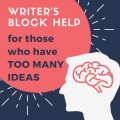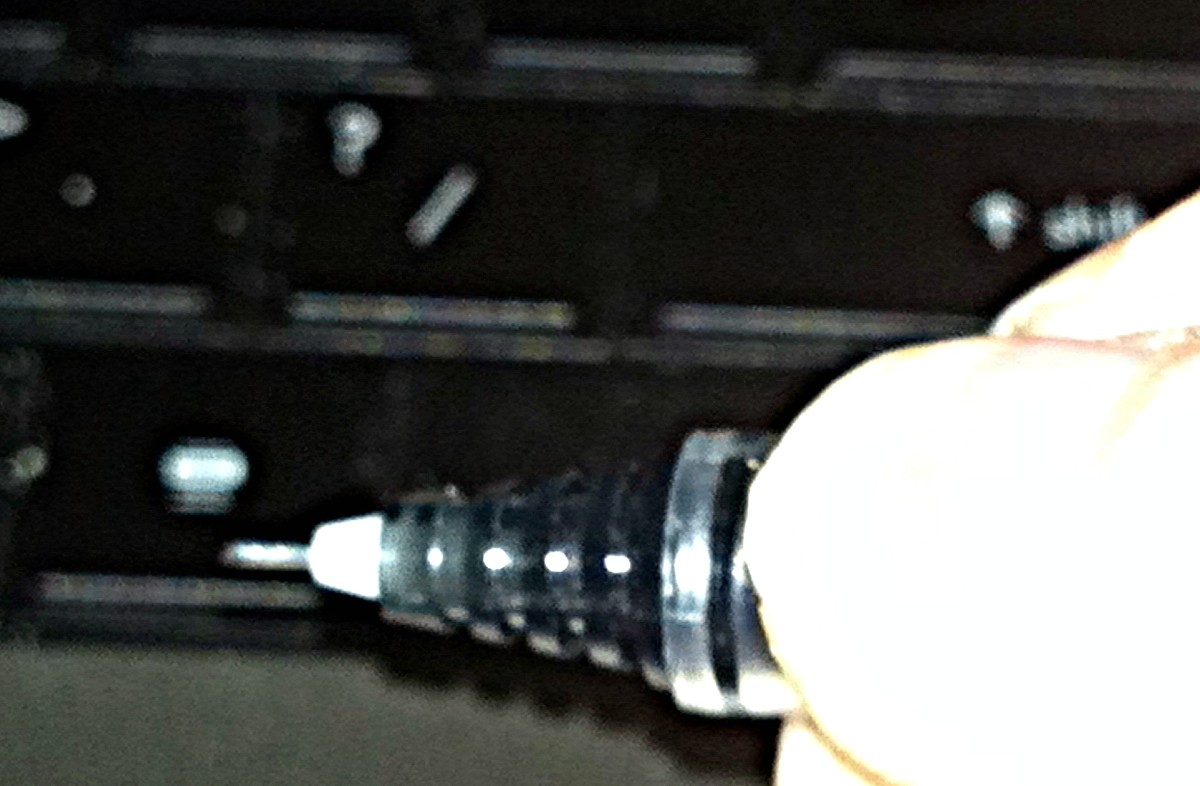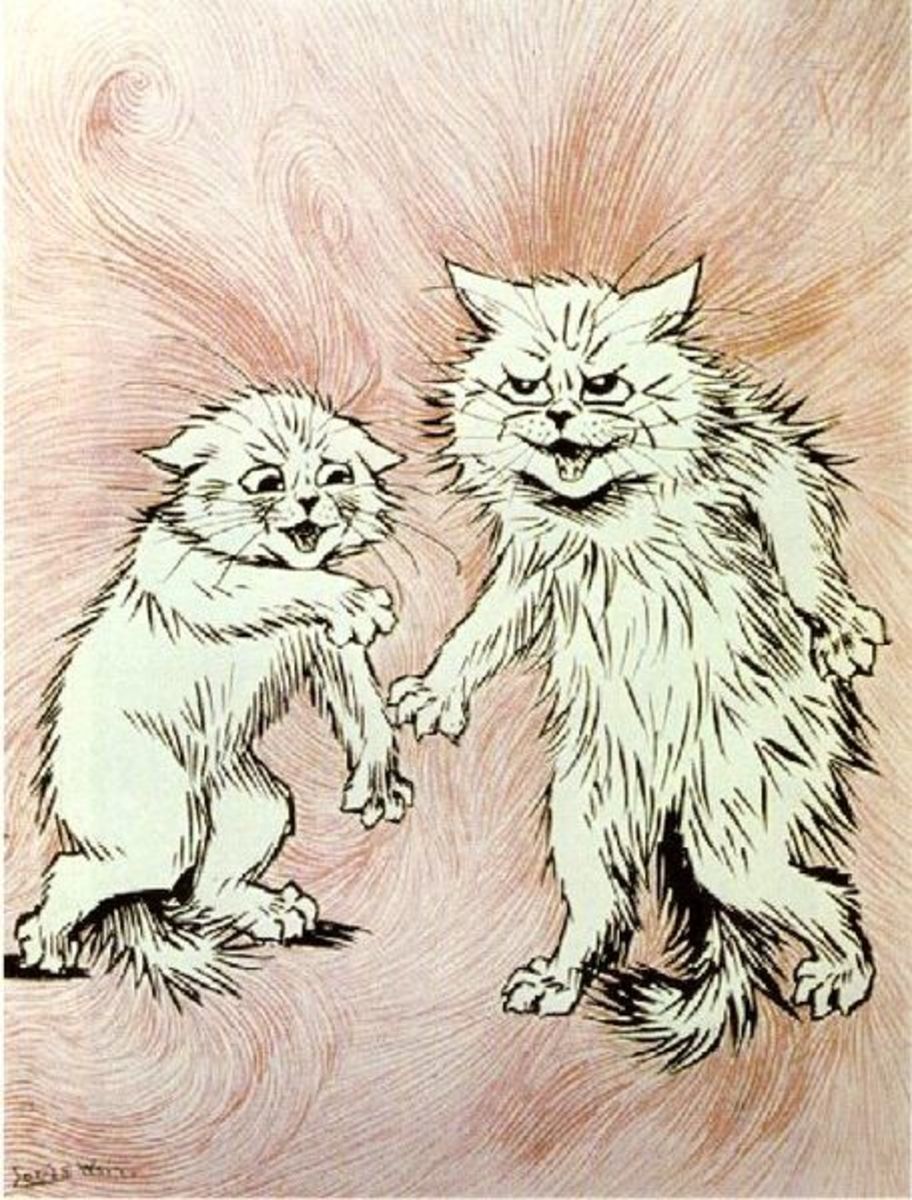Tips to Beat Writer's Block

Getting the writing juices flowing when you just have to write
Writing can relieve stress, allowing you to vent your frustrations, worries, or creative energies onto a page, but it can also create stress when you are required to write and no ideas flow onto that blank page or computer screen. Often the best idea is to just walk away from a writing project and come back later when you are fresh. Sometimes, however, that isn't an option.
When you are working on a deadline, either for a professional project, school assignment, or just for yourself, you don't always have the luxury of coming back to the writing whenever you feel inspired. So what do you do then?
You improvise. You continue writing even though you have nothing to say.
Here are 5 ways to get the writing juices flowing again when you are hit with writer's block.
1. Talk to Someone Else About Your Writing
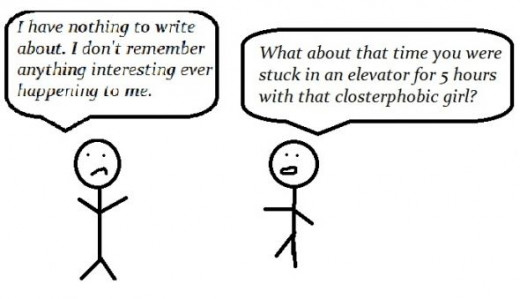
When I was tutoring college English, I heard "I have to write about a 'significant experience,' but I don't have any. Nothing ever happened to me," or things like it, from countless students.
It always turned out they did have something to write about. They often couldn't think of something because they were stuck on the idea their "significant experience" had to be a giant life-changing event, or because they were so against the assignment altogether, they had created a block. Usually, all they needed was to talk to someone else about the assignment to get the ideas flowing.
When people came to me complaining they had no "significant experiences" to speak of (a topic common for the developmental classes which tried to get incoming Freshmen up to speed with college academic writing), often all it took was me saying "Really? Nothing ever happened to you? Nothing at all?" Frequently, they would respond, "Well, there was this one thing..."
When you feel suck, either at the beginning of a project, in the middle, or at the end, sometimes it helps to just talk it out with another person. A tutor, teacher, or other writing professional isn't necessary. A friend can be just as much help. Just explain to them what it is you are stuck on. Sometimes they will give you an idea to break your block, and sometimes just talking out loud about your project will be enough to get you writing again.
Particularly when you are looking for ideas to start a project, talking to people is a great idea. Friends may think of some event you'd forgotten or topic you enjoy that you hadn't considered before. They often can offer other angles of attack as well or come up with counter-arguments you might have overlooked.
The bottom line is...
If your brain isn't giving you enough juice to write on, go find another brain.
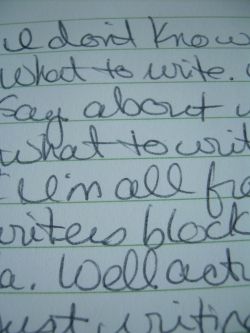
2. Write "I don't know what to write"
"I'm having trouble starting my essay."
"Well, just begin writing ideas down. It doesn't need to make sense at this stage."
"I don't know what to write!"
"So write that."
"What?"
"Write 'I don't know what to write.'"
The first time most people hear this idea they immediately dismiss it at ridiculous and sometimes even belittling. However, every person I have given this advice too, who has taken it, has told me--usually surprised and shocked--that it actually worked. I've even done it myself on more than one occasion.
Once you get that pen moving, ideas start moving too. Don't confine yourself to writing "I don't know what to write" a certain number of times, just begin writing the sentence over and over as a starting point. Keep in the back of your head that idea your stuck on as well. Even if you aren't actively thinking about it, your brain is still working on the idea, and it will often come out on the paper.
It may take two "I don't know what to write"s or ten, but eventually other things should start coming out on the page. Don't worry if they are only things like "I hate doing this" or "what's the point of writing this dumb sentence" at first, eventually you should begin to have ideas about your writing project.
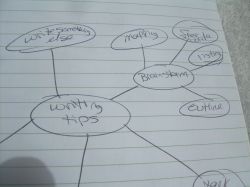
3. Brainstorm on paper
A lot of times writer's block appears because the writer is too caught up in how to complete the project, he or she can't think of what information to put in the project in order to complete it. Brainstorming removes all the structure from the assignment and just gets down to the ideas.
Brainstorming is a general term for many techniques. It can include mapping, listing, outlining, writing an exploratory draft, jotting down random ideas or phrases, or simply looking up videos, photos, or articles for inspiration. Its purpose is to develop ideas so you have a jumping off point to begin writing.
Whatever you use to generate ideas is good. The point of this technique is to get ideas down without worrying about whether or not you are conforming to the structural guidelines of the assignment.
The brainstorm doesn't even need to look like anything resembling a draft or writing assignment. The photo in this section is an example of a mapping brainstorming session I did for this lens.
- Brainstorming Techniques and Tips
A more thorough explanation of brainstorming, with several different techniques, examples, and tips. - Thinking Maps
A detailed breakdown of thinking maps, a type of brainstorming an organization technique, with examples of each kind.
Remember that you can brainstorm at any stage of the writing process. This is not just a technique to start a project. ANY time you feel yourself stuck, you can grab a piece of paper and brainstorm.

4. Write something else
Sometimes all it takes to get the creative juices flowing is to write something, anything. This is the basis of the "I don't know what to write" exercise. You don't need to write "I don't know what to write" in order to get the writing juices flowing, however.
Try writing creatively or in a journal/diary. Write an e-mail, letter, or even a text (as long as its long). The important part is not where you are writing but that you are writing. Tweets and facebook updates aren't sufficient. They are generally too short to really create good creative juices. However, they can be avenues for talking to others about your writing when you can't face to face.
Once you pick a medium to convey your thoughts, just start writing them. Like the "I don't know what to write" idea, you will want to keep your project in the back of your head as you do so. You will often find that once you start writing about something else, you will come up with ideas for the project that was freezing your writing abilities.
5. Do something else while you think about your project.... - ...and ask yourself some questions.
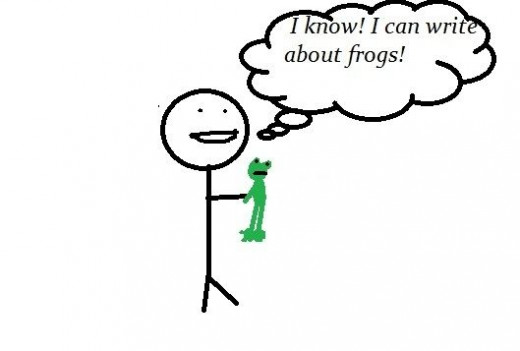
If you find yourself staring at the computer screen or sheet of paper and your mind is blank, even if you are on a time crunch, often the best thing to do is step away for a time. How long you step away depends on how much time you have, but whether you walk away for two minutes or two hours, sometimes just getting away from the empty screen can help unfreeze a block.
This usually works best for me while I'm moving--taking a walk, grocery shopping, cooking. Movement isn't necessary though, if you think better stationary. The important part is you are in an atmosphere where you think well. If that's jogging in the morning, driving to work, making brownies, or just laying in bed, it doesn't matter. As long as it's a place and activity that allows you to think, you are good.
So you've gotten into a thinking sort of place, now what questions should you ask yourself?
Start with basic sorts of things, the general idea of the project. For example, if your project is about personal experiences ask yourself what memories you revisit most often. If it's about controversial topics, think about all the debatable topics you can remember. Don't worry about thinking of whether or not you actually want to write on that topic. The idea is to get your brain generating ideas.
If you have the basic idea in mind, ask yourself what sort of points you want to address or mood you want to create. Try listing off every point that proves your argument or asking yourself if you know any facts or anecdotes that could help prove your point. Likewise, you can ask yourself what sort of counter-arguments could be presented against your argument.
If you are stuck farther along in your project, ask yourself if there is anything you haven't addressed or if there is anything someone else might want to know. If you are working on an introduction, think of how you would explain to someone what your project was about. A conclusion? Think of what you want your audience to get out of the paper.
What about you?
Everyone has writing tricks that work best for them when they get stuck on a writing project. What's yours?

